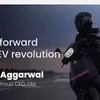Despite global chip shortage, how Ola Electric was able to make its first deliveries
Ola Electric on Wednesday began the deliveries for Ola S1 scooters. Special events were organised for the first 100 customers today in Bengaluru and Chennai who came with their friends and family to ride Ola S1 and S1 Pro back home.
On Wednesday, 's office in Bengaluru was bustling with the first 100 customers from Bengaluru and Chennai. The final production of the scooters had begun on October 15, 2021, and the scooters had over a lakh pre-bookings for the electric scooters.
In an earlier conversation with YourStory, Bhavish Aggarwal, Co-founder and Group CEO, Ola said they had announced the company's ambitious plan to lead India's EV revolution nearly four years ago.
“At the time, EVs weren’t the hot topic as it is today. People were ridiculing everyone who got into EV. But we believed India should take a leadership stance in the world in the space," he said.
Today, while Bhavish is present at the first deliveries of its scooters, he has chosen to take to the background, letting the team help with the first deliveries and openings. Ola Electric has so far manufactured over several thousand scooters which have been dispatched from the Ola Futurefactory to be delivered until December 31st, across India.

Ola Electric CEO Bhavish Aggarwal launching first 100 scooters
Ola was able to complete the deliveries despite a global chip shortage. The global chip shortage is an ongoing crisis where the demand for semiconductor chips or integrated circuits is much greater than the supply. This, in turn, has affected over 169 industries like cars, video game consoles, graphic cards, electric vehicles, and others that needed these chips.
The chip shortage has also impacted the production of several products, and Ola Electric had to face delays of several weeks. However, the team was able to manage the delay and shortage with the right supply chain optimisations.
The team added that the earlier conversations they have had with the suppliers helped with managing the impact. They were able to manage the shortage by planning short batch productions.
Varun Dubey, Chief Marketing Officer, Ola said in a conversation with YourStory,
"The journey has had its ups and downs. The two-week delay itself was hard to manage. It meant days and nights of managing the supply chains, understanding where the shortages have been, where they will be and managing those. In the end, it had to be about the customer. We had a promise to keep; the chip shortage is a global problem, but we knew the scooters had to be delivered as it was our first set of deliveries, and nothing could go wrong."
“For us to be a leader in the world, we have to lead the technologies of the future to build them in India. We have to build world-class products from India, and I believe, Indians have the best talent and access to capital and now the market. It is with that vision that we started Ola Electric,” Bhavish had said.
The scooters have been developed at Ola FutureFactory, which will be run and operated by 10,000 women workers at full capacity of 10 million scooters by 2022.
Varun said, “Today is a landmark day for those who have joined the revolution with us as we begin our deliveries of Ola S1. We are working hard to ramp up the production at the Ola Futurefactory to get the scooters in the hands of our customers as per their delivery windows. Thank you all for being a part of this iconic milestone and helping us accelerate the transition to sustainable clean mobility. This is just the beginning of the revolution, and from here we look forward to offering customers a seamless, convenient, and timely doorstep delivery and ownership experience.”
Ola Electric announced the launch and prices of its much-awaited electric scooter — S1, with two variants S1 and S1 Pro, on India's 75th Independence day. The scooters will be available for purchase from September 8, and deliveries will begin in October. The Ola S1 and Ola S1 Pro are priced at Rs 99,999 and Rs 1,29,000, respectively.
While the team had acquired the Amsterdam startup Etergo to launch electric two-wheelers in May last year, Bhavish adds the design, body, and every engineering aspect of the vehicle is now changed.
Bhavish and his team at Ola have been doing all of this besides operating the shared mobility division in tandem
Edited by Kanishk Singh








